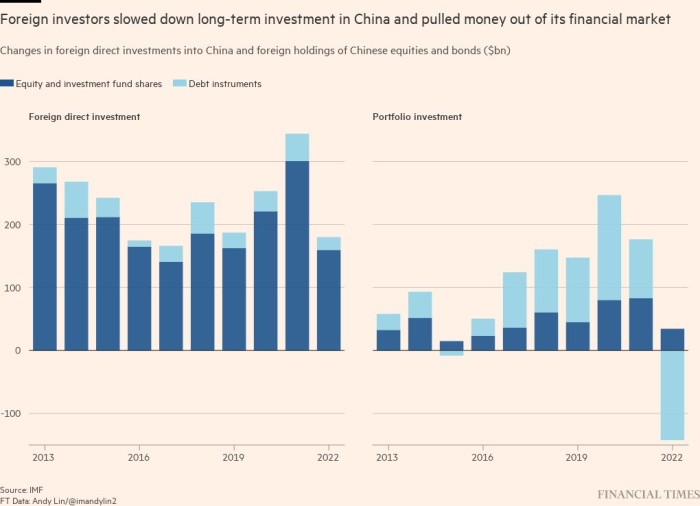Featured Sponsor
| Store | Link | Sample Product |
|---|---|---|
| UK Artful Impressions | Premiere Etsy Store |
For the cover of its latest position paper on doing business in the world’s second-largest economy, the British Chamber of Commerce in China deliberately chose red this year.
Although the color is auspicious in Porcelainin the west it can mean negativity and a barrier, as in stop signs and traffic lights.
That ambiguity is meant to capture the situation in China today. While sentiment has improved since 2022, when Beijing’s zero-Covid policy crushed the economy, mixed messages and vague rulemaking in critical areas like data security are keeping foreign companies on the edge.
The latest shock came this week when China banned the products of US chipmaker Micron of critical information infrastructure, following a G7 meeting in Hiroshima over the weekend, in which the group accused Beijing of economic coercion and militarization of the South China Sea.
Micron ban adds to raids in China on foreign consultancies in recent weeks, which included the arrest and disappearance of five employees of the US firm Mintz, and the ban on the auditor Deloitte.
Uncertainty increases despite the communist party starting the year with a more positive message. At the annual “two-session” meeting of China’s parliament in March, the new premier, Li Qiang, took pains to emphasize that the country was open for business again.
Li said he had talked with multinationals, including US companies. “Everyone told me they were optimistic about the future” of China, she said. He followed this up with speeches and panel discussions at the country’s biggest business forums, in which he assured CEOs that the worst of zero-Covid was over.
But tension with the US, which is one source of Beijing’s growing distrust of foreign companies, has continued to fester. It was exacerbated by February Spy balloon controversy.
Both sides accuse the other of obstructing attempts to repair communications. “We are getting this very mixed message,” says Zou Zhibo, deputy director of the CASS Institute for World Economics and Politics, a think tank that is closely linked to the Chinese government. He says efforts to mend relations during a November meeting between US President Joe Biden and Chinese leader Xi Jinping failed after the US imposed high-tech export controls. “There is no trust because we don’t know who to trust.”
For investors, the crackdown on consultancies has had a chilling effect. The authorities’ targets range from mainstream blue-chip firms like Bain and deep-dive due diligence firms like Mintz to expert companies that maintain a Rolodex of specialists investors can call upon when exploring an acquisition or planning to obtain assets from a supplier. .
The raids, for which there has been little or no explanation beyond allegations that the suspects were sharing information deemed relevant to national security, have alarmed foreign consultants operating in China.
A consultant for a European company says the government has always been interested in controlling information flows. But now it was classifying more and more data as sensitive under the “national security” label. He adds that the growing emphasis on national security has increased the risks for consulting staff. “I’m…ready for anything if it gets really tough business-wise,” he says. “I’m always worried about individual employees.”
For UK businesses, the issues include uncertainty caused by sudden regulatory changes, such as when the government cracked down on internet platforms in 2021, and even the end of the zero-covid policy itself, which caught the UK by surprise. the companies.
The British chamber said that while its members were less pessimistic (this year 76% were more optimistic about business in China compared to a record 42% pessimistic late last year), 70% he said he was adopting a wait-and-see attitude. -y-see focus.
All of this is contributing to lackluster returns in Chinese stocks and dragging down the country’s economic recovery. As a consultant for a US company puts it, everyone who has clients in China today advises them on risks, ranging from the danger of conflict in the Taiwan Straits to how to make their data meet the changing requirements of Beijing.
“Boardrooms are obsessed with this. They’re not quite sure how to draw the line: ‘Maybe I need to keep a lighter footprint in China, or maybe keep less capital there, or be more nimble,’” she says.
joseph.leahy@ft.com
—————————————————-
Source link
We’re happy to share our sponsored content because that’s how we monetize our site!
| Article | Link |
|---|---|
| UK Artful Impressions | Premiere Etsy Store |
| Sponsored Content | View |
| ASUS Vivobook Review | View |
| Ted Lasso’s MacBook Guide | View |
| Alpilean Energy Boost | View |
| Japanese Weight Loss | View |
| MacBook Air i3 vs i5 | View |
| Liberty Shield | View |

